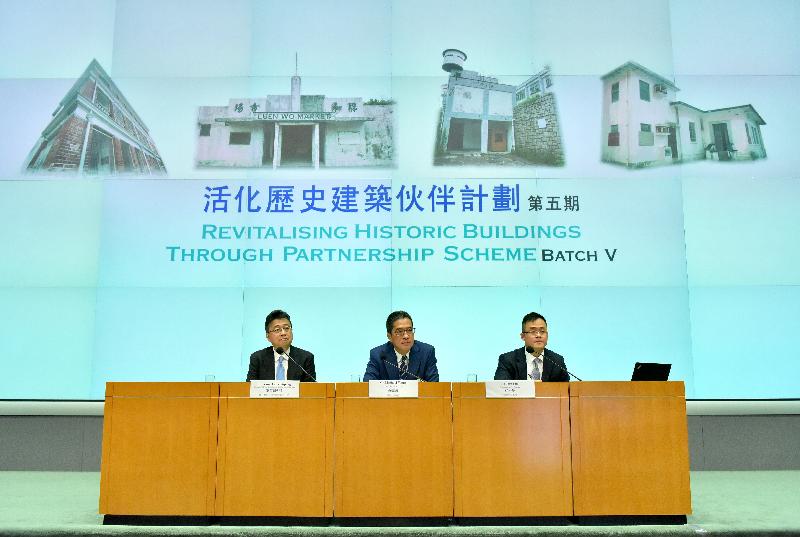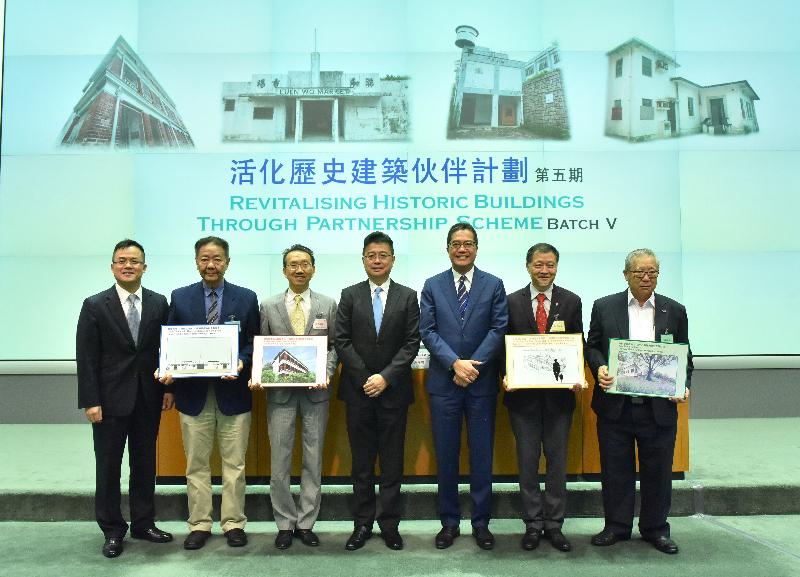The Development Bureau announced today (July 5) that four projects proposed by non-profit-making organisations (NPOs) have been selected to revitalise Roberts Block of the Old Victoria Barracks in Central, Luen Wo Market in Fanling, the Former Lau Fau Shan Police Station in Yuen Long and Watervale House of the Former Gordon Hard Camp in Tuen Mun under Batch V of the Revitalising Historic Buildings Through Partnership Scheme (Revitalisation Scheme).
Roberts Block of the Old Victoria Barracks (a Grade 1 historic building) will be converted into the Roberts Block Open HeArts Centre by Christian Oi Hip Fellowship Limited together with Art Hub Asia Company Limited. The Centre will organise a series of creative arts workshops and therapy programmes to promote psychological and emotional wellness, and provide useful skills for people in need to reduce stress. Guided tours will also be arranged for the public to learn more about the history and architectural features of the building.
Luen Wo Market (a Grade 3 historic building) will be turned into Luen Wo Market – House of Urban and Rural Living by Hong Kong Lutheran Social Service, LC-HKS. The project will revive traditional market operations with stalls and shops selling local vegetables, farm products and daily necessities. Through a variety of guided tours, workshops and activities, the project will show visitors the history and changes of Luen Wo Market and its surrounding rural area, thereby enhancing their understanding of rural lives.
The Former Lau Fau Shan Police Station (a Grade 3 historic building) will be revitalised into Former Lau Fau Shan Police Station – Hong Kong Guide Dogs Academy by Hong Kong Guide Dogs Association Limited. Guide dogs will be bred and trained at the site to provide service to the visually impaired. Some dogs will be trained to provide therapy for people in need, such as children who suffer from autism and communicative problems. The Academy will also display the history and architectural merit of the police station building as well as the development of oyster farming and the fisheries industry in the Lau Fau Shan area through organising different displays and guided tours.
Watervale House of the Former Gordon Hard Camp (a Grade 2 historic building) will be revitalised by the Tuen Mun Soul Oasis Foundation Limited into the Tuen Mun Soul Oasis, promoting a positive lifestyle through workshops, talks and courses on positive thinking and spiritual development. Themed guided tours and workshops will be arranged to introduce the history and heritage of the military site and the Tuen Mun area. There will be a featured restaurant with a menu including Gurkha food to promote Gurkha food culture.
The Secretary for Development, Mr Michael Wong, said at the press conference, "The Development Bureau launched the Revitalisation Scheme in 2008. Through collaboration with NPOs, historic buildings are preserved, revitalised and put into good use. Under the scheme, historic buildings are given a new lease of life and the public has the opportunity to visit and appreciate these old buildings with heritage value. It is also expected that, through the revitalisation projects, old communities are rebuilt, employment opportunities are created, the local economy is stimulated, and niche social services are provided.
"The Scheme has been in place for 10 years. Including the four projects announced today, there are a total of 19 projects. Nine of them are already in operation and had received about 4.6 million visitors by the end of May this year. Among them, five scooped up United Nations Educational, Scientific and Cultural Organization Asia-Pacific Awards for Cultural Heritage Conservation. This proves that our adaptive re-use of historic buildings has won international recognition and the results are truly heartening."
Mr Wong thanked members of the Advisory Committee on Built Heritage Conservation for their professionalism and dedication in selecting the best adaptive re-use for the historic buildings under Batch V of the Revitalisation Scheme.
The Government will earmark funding of about $365 million to renovate the four historic buildings and a further $18 million for subsidising the initial operation of the projects. The projects in this batch are expected to be completed and come into operation from 2022 to 2023, and will create over 120 full-time or part-time jobs.
The Advisory Committee on Built Heritage Conservation assessed 34 applications received under Batch V of the Revitalisation Scheme in accordance with the following five criteria:
* reflection of historical value and significance;
* technical aspects;
* social value and social enterprise operation;
* financial viability; and
* management capability and other considerations.
For Fong Yuen Study Hall (a Grade 3 historic building) in Ma Wan under the same batch of the Revitalisation Scheme, the Committee did not recommend any proposal.
The Chairman of the Committee, Professor Lau Chi-pang, said, "The Committee has concluded after in-depth deliberation that the proposals had failed to meet the selection threshold in all five assessment aspects."
Fong Yuen Study Hall will continue to be managed by the Government and open to the public for the time being. The Government will examine the site's long-term use, including a relaunch of the building in the next batch of the Revitalisation Scheme for applications from NPOs.
Details of the selected projects can be found at the heritage conservation website at www.heritage.gov.hk.
The Government launched the Revitalisation Scheme in 2008 to invite proposals from NPOs to revitalise selected government-owned historic buildings in the form of social enterprises. Where justified, the Government will provide financial support to the selected organisations, including one-off grants to cover the cost of major renovation of the buildings, in part or in full; nominal rental for the buildings; and one-off grants to meet the starting costs and operating deficits of the social enterprises for a maximum of the first two years of operation at a ceiling of $5 million per project, on the prerequisite that the selected proposal is projected to become self-sustainable after this initial period.
Follow this news feed: East Asia







